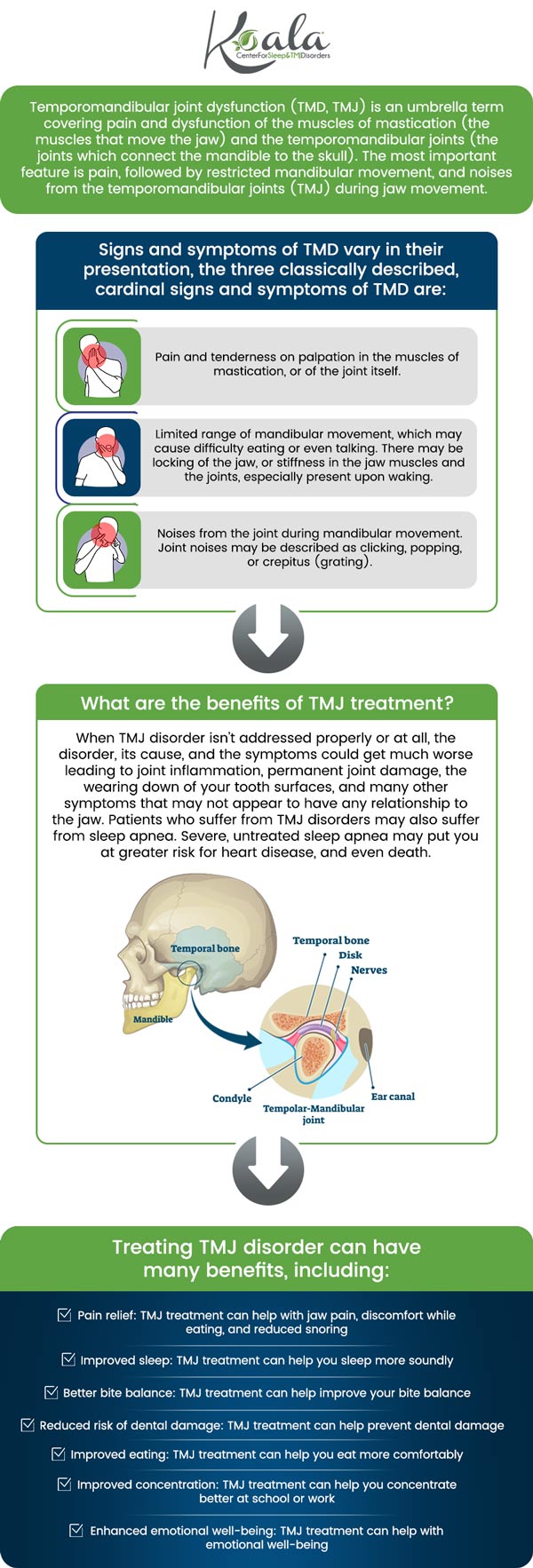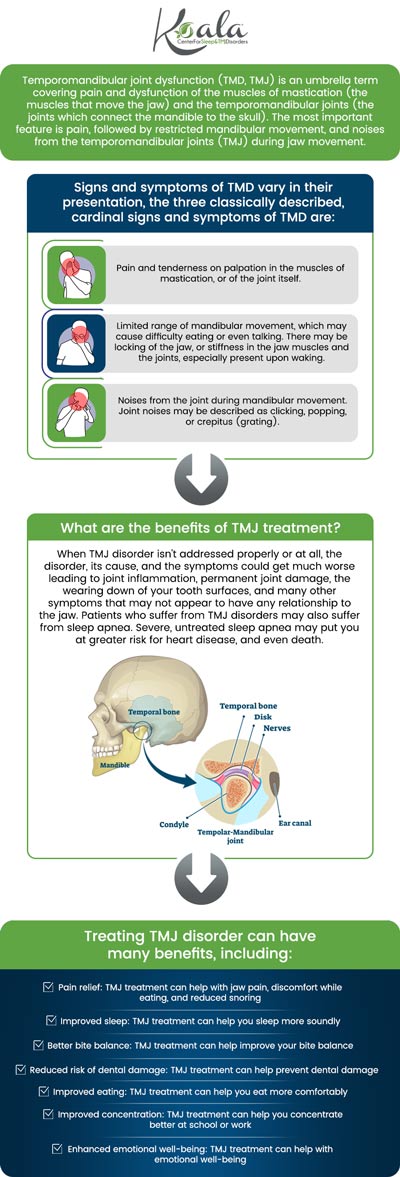TMJ (Temporomandibular Joint) Disorders Are a Family of Problems Related to Your Complex Jaw Joint
TMJ disorders refer to a group of conditions affecting the complex jaw joint and surrounding muscles. These disorders can cause pain, limited movement, and discomfort in the jaw, face, and head. At Koala® Center For Sleep & TMJ Disorders, we offer comprehensive evaluations and personalized treatments to address these issues. Our goal is to improve jaw function and reduce pain for a better quality of life. For more information, please contact us today or request an appointment online. We have convenient locations in Bloomington IL, Peoria/Dunlap IL, El Paso TX, and Wausau WI.


Table of Contents:
Can TMJ disorders cause headaches?
How do TMJ disorders affect jaw movement?
Is teeth grinding and clenching related to TMJ?
Does TMJ cause dental problems?
At Koala® Center For Sleep & TMJ Disorders, we understand that temporomandibular joint (TMJ) disorders are often an underlying cause of chronic headaches. The temporomandibular joint connects your jawbone to your skull, enabling essential daily functions such as chewing, speaking, and yawning. When this joint or the surrounding muscles become strained, inflamed, or dysfunctional, headaches of varying intensity and frequency may result.
Patients experiencing TMJ-related headaches often notice symptoms arising from increased tension or strain in the muscles, ligaments, and nerves surrounding the jaw joint. Factors such as bruxism—excessive teeth grinding or clenching during sleep—are common contributors. TMJ-related headaches frequently present as tension-type headaches or even migraines, with pain commonly felt in the temples, forehead, behind the eyes, or radiating into the neck and shoulders.
At the Koala® Center For Sleep & TMJ Disorders, our team specializes in accurately diagnosing TMJ disorders by carefully evaluating symptoms such as jaw pain or stiffness, clicking or popping sounds during jaw movement, limited jaw mobility, and recurring headaches. Our comprehensive treatment approach includes conservative and non-invasive therapies tailored to each patient. These may include custom dental splints or oral appliances, specialized physical therapy, stress management techniques, lifestyle modifications, and medication to alleviate inflammation and pain. Additionally, when appropriate, we address underlying dental issues such as tooth alignment and bite imbalances to provide lasting relief.
At Koala® Center For Sleep & TMJ Disorders, we understand the significant impact temporomandibular joint (TMJ) disorders can have on your daily life, sleep quality, and overall health. TMJ disorders can dramatically affect jaw function and mobility, making everyday tasks such as chewing, speaking, yawning, and even sleeping comfortably a challenge.
Patients experiencing TMJ disorders frequently report stiffness, pain, and restricted jaw movements. You may notice clicking, popping, or grinding sensations when opening or closing your mouth, indicating that the joint’s cartilage disc may be misaligned or compromised. Muscle tension, inflammation, and tenderness in the jaw area can further exacerbate discomfort, causing fatigue and difficulty in achieving restful sleep.
In more severe situations, TMJ disorders can lead to jaw-locking episodes, where your jaw temporarily becomes stuck in an open or closed position. These episodes not only hinder your ability to perform daily functions comfortably but also significantly disrupt your sleep patterns and overall quality of life. Chronic TMJ disorders may cause ongoing pain and discomfort, prompting you to subconsciously alter jaw movements or posture to avoid pain. Over time, this adaptive behavior can lead to further imbalance, strain, and muscle fatigue.
At Koala® Center For Sleep & TMJ Disorders, we emphasize accurate diagnosis and targeted, personalized treatment plans to restore healthy jaw function, improve sleep quality, and enhance your overall well-being. Our multidisciplinary approach may include oral appliance therapy, dental splints, physical therapy, targeted muscle exercises, medication management, or, in rare, severe cases, surgical intervention.
We are committed to helping you alleviate symptoms, regain comfort, and achieve restful sleep, significantly improving your quality of life.
Teeth grinding and jaw clenching, medically known as bruxism, are closely associated with temporomandibular joint (TMJ) disorders. At Koala® Center For Sleep & TMJ Disorders, we understand the importance of addressing bruxism early to protect your jaw joint health. The temporomandibular joint connects your jawbone to your skull, facilitating essential daily functions like chewing, speaking, and yawning. Excessive grinding or clenching places increased pressure on this joint, leading to inflammation, pain, and impaired function.
Patients who grind or clench their teeth, especially during sleep, often experience symptoms such as jaw pain, headaches, clicking or popping sounds in the jaw, difficulty opening or closing the mouth, and discomfort in the facial and neck muscles. Over time, chronic bruxism can result in structural changes within the joint, damage to cartilage, and strain on surrounding muscles, contributing to the development or worsening of TMJ disorders.
At Koala® Center For Sleep & TMJ Disorders, we recognize the complex connection between bruxism and TMJ disorders, which can involve multiple factors, including stress, anxiety, misaligned teeth (malocclusion), and certain sleep or neurological conditions. Our team provides personalized evaluations and customized solutions, such as specialized oral appliances, stress management techniques, and therapeutic interventions, to help manage bruxism effectively and reduce the risk of TMJ-related complications.
If you experience persistent jaw discomfort, headaches, or other symptoms associated with bruxism or TMJ disorders, we invite you to schedule a consultation with our experienced team at Koala® Center For Sleep & TMJ Disorders. Together, we can develop a tailored treatment plan designed to improve your comfort, protect your oral health, and enhance your quality of life.
At Koala® Center For Sleep & TMJ Disorders, we understand that temporomandibular joint (TMJ) disorders involve the muscles and joints responsible for jaw movement, and we specialize in addressing these concerns comprehensively. Although TMJ disorders are commonly associated with symptoms like jaw pain, clicking noises, and limited jaw mobility, they can also significantly impact your dental health.
Patients experiencing TMJ dysfunction often unconsciously grind or clench their teeth (bruxism), especially during sleep. Persistent bruxism can lead to excessive tooth wear, enamel erosion, tooth fractures, and increased tooth sensitivity. Over time, this continual pressure may weaken dental restorations and result in further oral health complications.
Additionally, jaw misalignment due to TMJ disorders can cause uneven bite forces, creating abnormal wear patterns and placing excess stress on specific teeth. This imbalance can lead to damaged teeth, premature tooth wear, mobility issues, and discomfort.
Moreover, chronic muscle tension and restricted jaw movement associated with TMJ disorders can make daily oral hygiene practices challenging. Difficulty brushing and flossing comfortably increases the risk of cavities, gum inflammation, and periodontal disease.
At Koala® Center For Sleep & TMJ Disorders, our experienced professionals provide specialized evaluations and personalized treatment plans to address both the direct symptoms of TMJ disorders and their indirect effects on your dental health. If you’re experiencing symptoms of TMJ disorder or are concerned about its potential impact on your oral health, we invite you to schedule a consultation with our dedicated team. Early diagnosis and targeted intervention can greatly improve your quality of life, restore oral comfort, and protect your dental health for years to come.
At Koala® Center for Sleep & TMJ Disorders, we specialize in diagnosing and treating TMJ (temporomandibular joint) disorders, a family of issues related to the complex jaw joint. Our providers use advanced diagnostic techniques to identify the root causes of your symptoms, such as jaw pain, headaches, clicking sounds, and difficulty chewing. With a personalized approach, we create customized treatment plans to help alleviate discomfort and improve jaw function.
Whether you’re dealing with TMJ-related pain or other associated symptoms, our team is dedicated to providing effective, non-invasive solutions tailored to your needs. At Koala® Center, we focus on patient comfort and long-term relief, ensuring that your TMJ disorder is treated with the care and expertise you deserve. If you’re seeking relief from TMJ symptoms, trust Koala® Center for Sleep & TMJ Disorders to guide you toward better health and comfort.

Additional Services You May Need
▸ KoalaKIDZzz®
▸ Sleep Apnea
▸ Snoring
▸ TMJ Disorder
▸ Fatigue
▸ Sleep Disorders
▸ Weight Loss
▸ CPAP Alternative
▸ Oral Appliances




